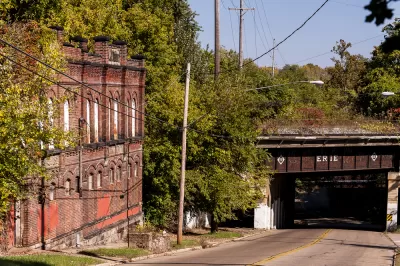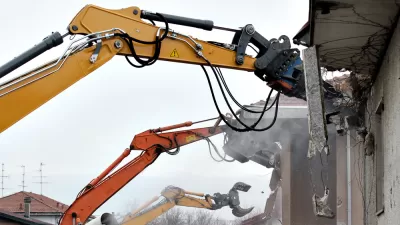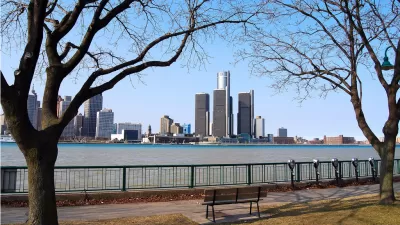Managed decline assumes that struggling cities will continue to struggle indefinitely. Is there a better way to plot neighborhood stabilization?

Jason Segedy, director of planning and urban development in the city of Akron, writes a dissent of the "managed decline" policies that gained traction in Rust Belt cities like Detroit as it struggled with the consequences of a shrinking population.
Segedy acknowledges the argument "that managed decline is a pragmatic approach to present-day economic realities." There is also an argument, adds Segedy, that managed decline is a fatalistic, self-fulfilling prophecy.
Are cities simply hapless victims, subject to the whims of the fates? Or can wise leadership, creativity, and strategic planning create demand to live in a place, and bring about a reversal of fortunes? People who remember Brooklyn in 1977, or East Berlin in 1983, would probably agree that places can change in dramatic and unexpected ways, and that it is sometimes darkest before the dawn.
In fact, argues Segedy, Detroit never actually threw its full bureaucratic weight behind managed decline, and many of its successes now result from embracing the slogan of Mayor Mike Guggan's administration: "Every neighborhood has a future."
To elaborate on the argument against managed decline, Segedy points out a few key areas that offer optimism in Rust Belt cities—and not just Detroit. Opportunities include for new housing, adaptive reuse, and creating incentives for new demand (beyond job creation).
FULL STORY: Housing First: Rejecting Managed Decline in the Rust Belt

Planetizen Federal Action Tracker
A weekly monitor of how Trump’s orders and actions are impacting planners and planning in America.

Congressman Proposes Bill to Rename DC Metro “Trump Train”
The Make Autorail Great Again Act would withhold federal funding to the system until the Washington Metropolitan Area Transit Authority (WMATA), rebrands as the Washington Metropolitan Authority for Greater Access (WMAGA).

The Simple Legislative Tool Transforming Vacant Downtowns
In California, Michigan and Georgia, an easy win is bringing dollars — and delight — back to city centers.

The Small South Asian Republic Going all in on EVs
Thanks to one simple policy change less than five years ago, 65% of new cars in this Himalayan country are now electric.

DC Backpedals on Bike Lane Protection, Swaps Barriers for Paint
Citing aesthetic concerns, the city is removing the concrete barriers and flexposts that once separated Arizona Avenue cyclists from motor vehicles.

In These Cities, Most New Housing is Under 441 Square Feet
With loosened restrictions on “micro-housing,” tiny units now make up as much as 66% of newly constructed housing.
Urban Design for Planners 1: Software Tools
This six-course series explores essential urban design concepts using open source software and equips planners with the tools they need to participate fully in the urban design process.
Planning for Universal Design
Learn the tools for implementing Universal Design in planning regulations.
Smith Gee Studio
City of Charlotte
City of Camden Redevelopment Agency
City of Astoria
Transportation Research & Education Center (TREC) at Portland State University
US High Speed Rail Association
City of Camden Redevelopment Agency
Municipality of Princeton (NJ)




























